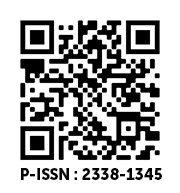Interceding Role of Agricultural Extension Services in Adoption of Climate-Smart Agricultural Technologies in Northern Ghana
DOI:
https://doi.org/10.36782/apjsafe.v10i2.175Keywords:
Count data, Poisson regression with endogenous treatment effects, adoption intensity, climate-smart agriculture, GhanaAbstract
As a result of the effect of climate change on food security and rural livelihoods, the promotion and adoption of climate-smart agricultural practices have become very crucial. The role of agricultural extension in the adoption decision process is an important factor. However, extension delivery systems in most developing countries face numerous challenges that raise concerns about their ability to bring about the desired impact on farm households’ decisions. Relying on data from a cross-section of smallholder farmers in Ghana’s northern savanna area, specifically the Tolon district, the study assessed the determinants of farmers’ decision to adopt climate-smart agriculture (CSA) practices as well as the intensity of adoption and the role agricultural extension plays in CSA adoption. Using a Poisson regression with endogenous treatment effects model to account for selectivity bias, the study observed that farmers adopt multiple CSA practices, with adoption being influenced by farmer group membership, size of herd and participation in off-farm work. Intensity of adoption, on the other hand, increased with access to agricultural extension, farm credit and input subsidy, but decreased with farm size and participation in off-farm work. Furthermore, an impact assessment indicated that participants in agricultural extension had 1.27 more adoption of CSA practices than they would if they had not participated in agricultural extension. The study concludes that there is a strong association between adoption intensity and access to agricultural support services such as extension, input subsidy and agricultural credit. The interceding role of extension in the adoption of CSA practices calls for more resources to be channeled towards extension service provision as a means to mitigate the effects of climate change and promote sustainable production at the farm level. The positive externalities from CSA adoption will go a long way to protect the environment, promote food security and rural livelihoods.
Downloads
References
Adzawla, W., Azumah, S. B., Anani, P. Y., & Donkoh, S. A. 2020. Analysis of farm households’ perceived climate change impacts, vulnerability and resilience in Ghana. Scientific African, 8. https://doi.org/10.1016/j.sciaf.2020.e00397.
Adzawla, W., Kudadze, S., Mohammed, A. R., & Ibrahim, I. I. 2019. Climate perceptions, farmers’ willingness-to-insure farms and resilience to climate change in Northern region, Ghana. Environmental Development, 32, 100466. https://doi.org/10.1016/j.envdev.2019.100466.
Alare, R. S., Owusu, E. H., & Owusu, K. 2018. Climate Smart Agriculture Practices in Semi-arid Northern Ghana: Implications for Sustainable Livelihoods. Journal of Sustainable Development, 11(5), 57. https://doi.org/10.5539/jsd.v11n5p57.
Anang, B. T., & Asante, B. O. 2020. Farm household access to agricultural services in northern Ghana. Heliyon, 6(11), e05517.
Anang, B. T., Bäckman, S., & Sipiläinen, T. 2020. Adoption and income effects of agricultural extension in northern Ghana. Scientific African, 7, e00219.
Aryal, J. P., Jat, M. L., Sapkota, T. B., Khatri-Chhetri, A., Kassie, M., & Maharjan, S. 2018. Adoption of multiple climate-smart agricultural practices in the Gangetic plains of Bihar, India. International Journal of Climate Change Strategies and Management, 10(3): 407-427.
World Bank. 2015. No Title Gender in climate-smart agriculture. IBRD, FAO and IFAD, Rome R. Ruben et al.
CARE International. 2013. Adaptation Learning Programme (ALP) climate change vulnerability and adaptive capacity in Northern Ghana. 1–16.
CCES (Centre for Climate and Energy Solutions) 2019. What Is Climate Resilience and Why Does It Matter? Climate Essentials, April, 12.
Donkoh, S. A., Azumah, S. B., & Awuni, J. A. 2019. Adoption of improved agricultural technologies among rice farmers in Ghana: A multivariate probit approach. Ghana Journal of Development Studies, 16(1), 46-67. https://www.ajol.info/index.php/gjds/article/%0Aview/186964.
Feldmeyer, D., Wilden, D., Kind, C., Kaiser, T., Goldschmidt, R., Diller, C., & Birkmann, J. 2019. Indicators for monitoring urban climate change resilience and adaptation. Sustainability (Switzerland), 11(10). https://doi.org/10.3390/su11102931.
Karbo, R. T., & Crentsil, A. O. 2021. Climate-Smart Agriculture (CSA) Adaptation Strategies of Farmers against Climate Change in Lawra Municipality, Upper West Region, Ghana. Journal of Scientific Research and Reports, 27(2), 10–19. https://doi.org/10.9734/jsrr/2021/v27i230355.
Lawson, E. T., Alare, R. S., Salifu, A. R. Z., & Thompson-Hall, M. 2020. Dealing with climate change in semi-arid Ghana: understanding intersectional perceptions and adaptation strategies of women farmers. GeoJournal, 85(2), 439–452. https://doi.org/10.1007/s10708-019-09974-4.
Le Roux, A., Engelbrecht, F., Paige-Green, P., Verhaeghe, B., Khuluse-Makhanya, S., McKelly, D., Dedekind, Z., Muthige,
M., Van Der Merwe, J., & Maditse, K. 2016. Climate adaptation: Risk management and resilience optimisation for vulnerable road access in Africa. Climate Threats Report: Council of Scientific and Industrial Research (CSIR), Paige-Green Consulting (Pty) Ltd and St Helens Consulting Ltd, July (December), 1–65.
MOFA (Ministry of Food and Agriculture). 2016. Agriculture in Ghana: Facts and Figures MOFA, Accra, Ghana, 2017. Report, 2017.
Minx, J. C., Callaghan, M., Lamb, W. F., Garard, J., & Edenhofer, O. 2017. Learning about climate change solutions in the IPCC and beyond. Environmental Science and Policy, 77(October 2016), 252–259. https://doi.org/10.1016/j.envsci.2017.05.014.
Amin, A., Mubeen, M., Hammad, H. M., & Nasim, W. (2015). Climate Smart Agriculture: an approach for sustainable food security. Agricultural Research Communication, 3(2), 13–21.
Shaw, A. and K. P. 2012. Working Paper No. 19 CGIAR Research Program on Climate Change, Agriculture and Food Security (CCAFS). Ccafs, 19, 1–30.
Tran, N. L. D., Rañola, R. F., Sander, B. O., Reiner, W., Nguyen, D. T., & Nong, N. K. N. 2020. Determinants of adoption of climate-smart agriculture technologies in rice production in Vietnam. International Journal of Climate Change Strategies and Management, 12(2): 238-256.
Wongnaa, C. A., & Babu, S. 2020. Building resilience to shocks of climate change in Ghana’s cocoa production and its effect on productivity and incomes. Technology in Society, 62(June), 101288. https://doi.org/10.1016/j.techsoc.2020.101288.
Zakaria, A., Baanni, S., Appiah-Twumasi, M., & Dagunga, G. 2020. Adoption of climate-smart agricultural practices among farm households in Ghana: The role of farmer participation in training programmes. Technology in Society, 63(June), 101338. https://doi.org/10.1016/j.techsoc.2020.101338.








